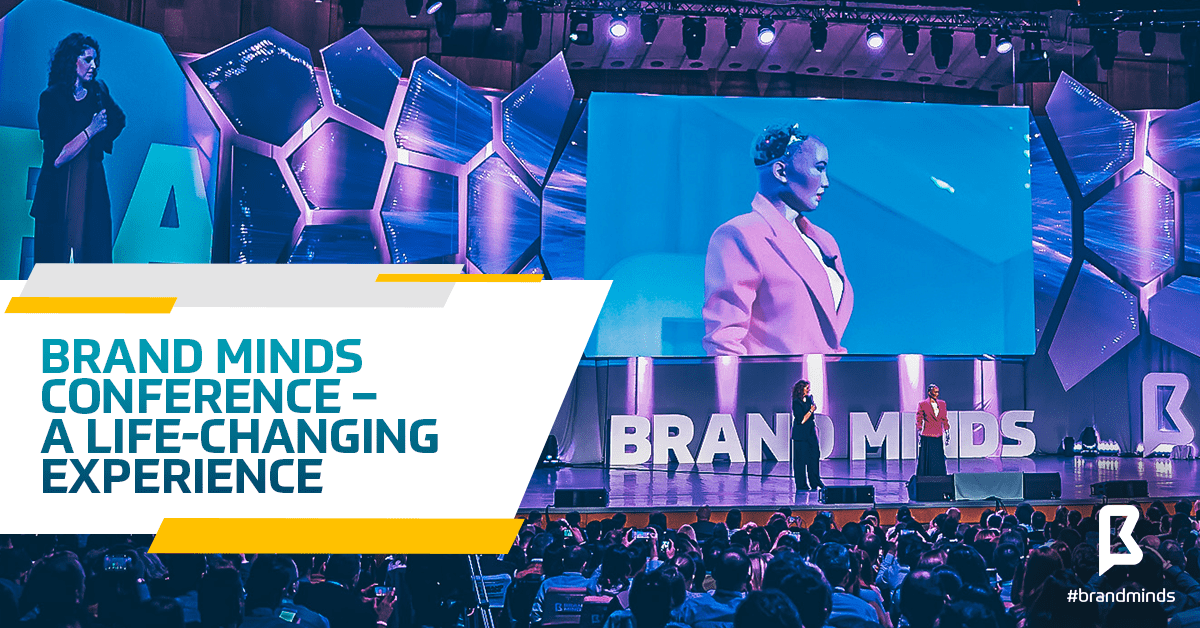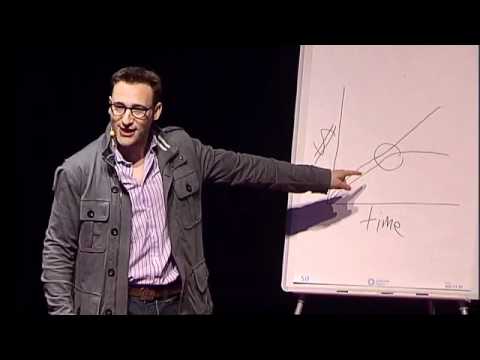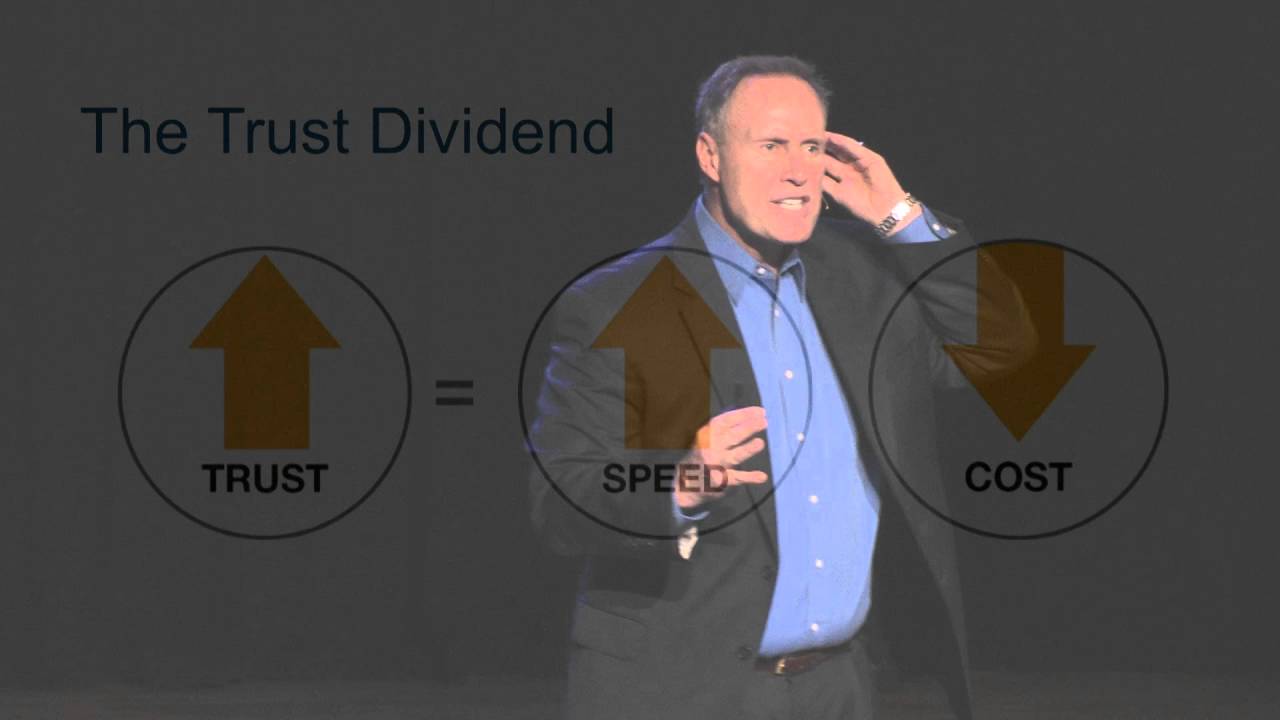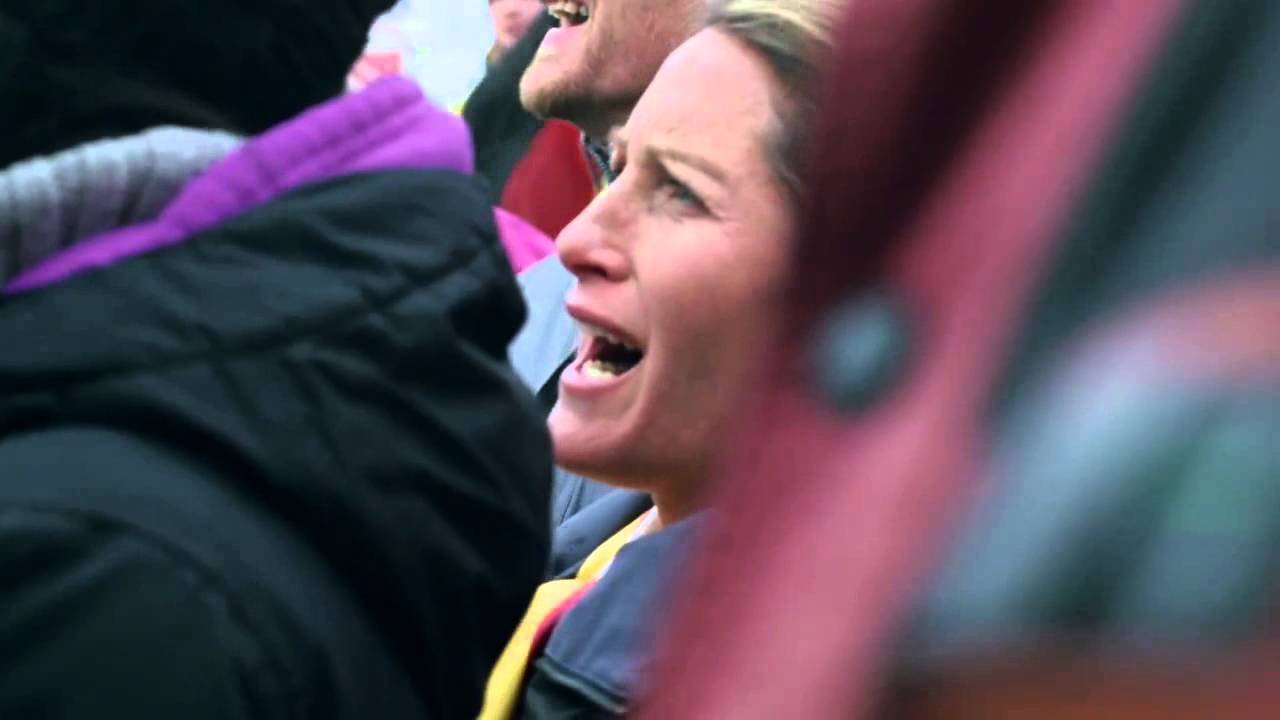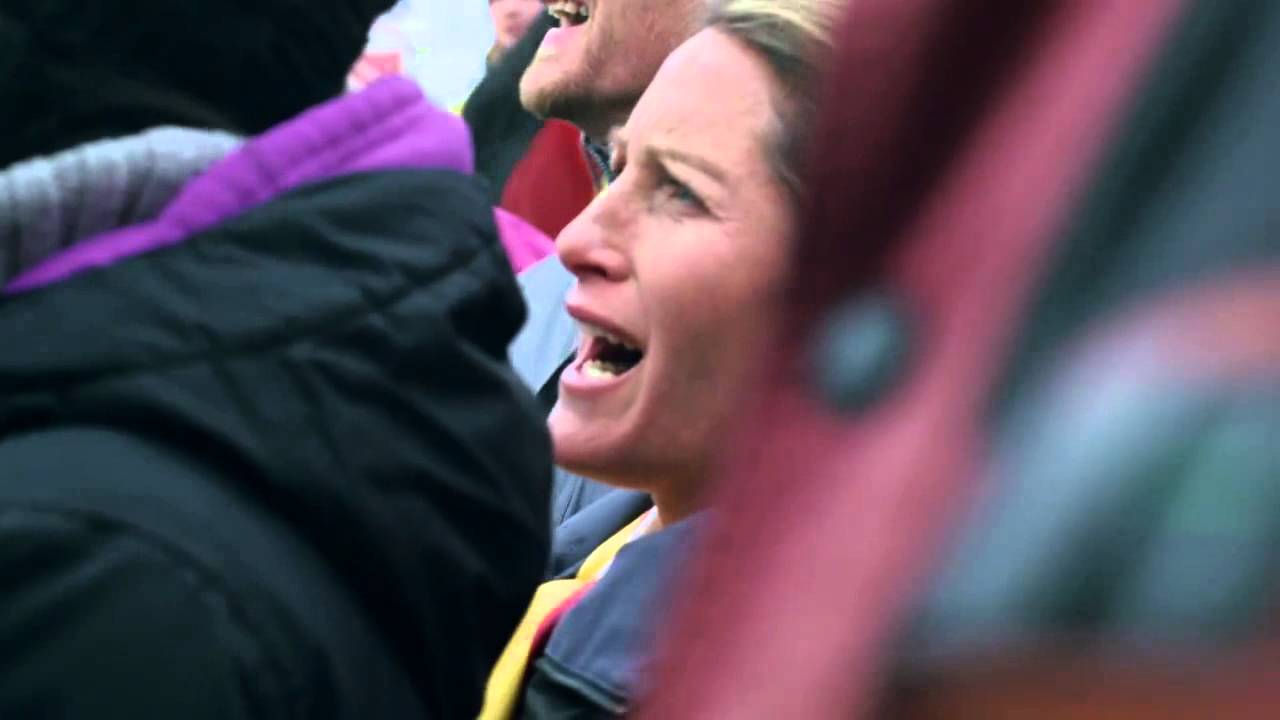BRAND MINDS Conference – A Life-Changing Experience
Are you looking for a life-changing experience? Come to the BRAND MINDS Conference!
You might say
Oh, I am not going to believe you because you are biased. Everything about BRAND MINDS is amazing in your eyes.
You are totally correct! I am proud of our conference and I’m sure the rest of the BRAND MINDS team feels the same.
Our conference is the result of a 12-month hard work. Starting with the selection of the best keynote speakers of the moment, to planning the entire logistics process, communication strategy and each detail that is meant to enhance the participant’s experience – everything is designed in great detail to ensure you have the best conference experience yet.
[bctt tweet=”BRAND MINDS: Everything is designed in great detail to ensure you have the best conference experience yet.” username=”brand_minds”]

www.VitzmanPhotography.com
Here is why BRAND MINDS is a life-changing experience:
Growing With Each Edition
Our conference has been growing with each edition. The attendees have increased in number year after year: from 300 in 2015 to 3000 in 2018.
The 2019 BRAND MINDS conference will host over 4200 attendees.
We have a lot of surprises prepared for these amazing world-changers and we’re looking forward to welcoming them.
Committed Partners
Our partners are leading companies in their respective fields and share our commitment to organize the best conference of the year.
They provide for BRAND MINDS attendees high-quality experiences in between speakers sessions, raising the bar with each edition.
Our conference wouldn’t be the same without them!
Valuable Insights – No Fluff Content
Don’t you hate it when you attend a conference and realize you could have found better use of your time? No valuable content, nothing you haven’t heard before. It’s so disappointing!
We receive positive feedback following every edition of BRAND MINDS. Many of the attendees share the same story: they tell us how they walk into the venue with high expectations and return home at the end of the event having their expectations met and even exceeded.
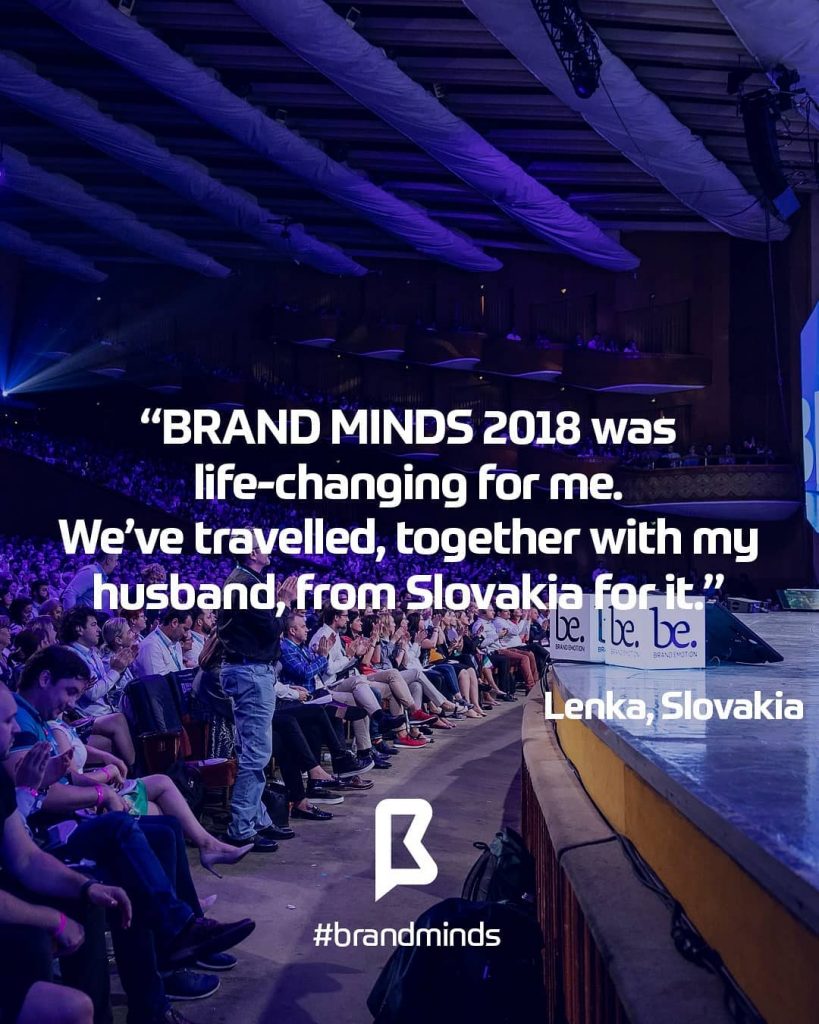
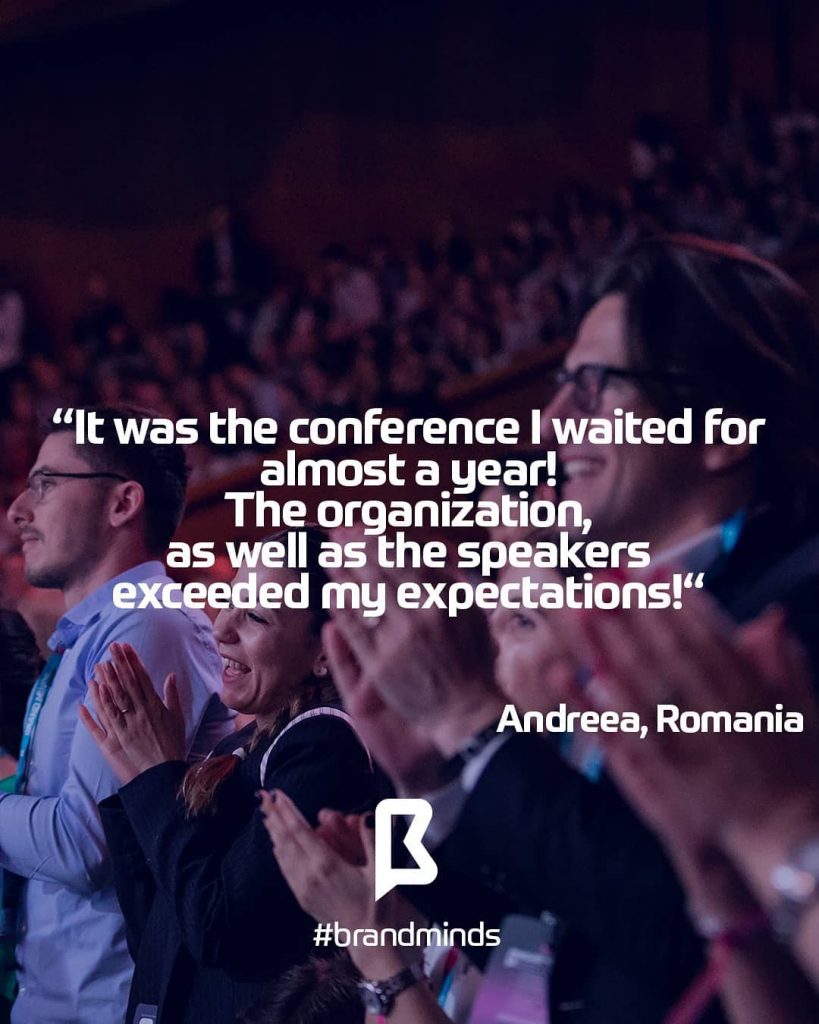
No fluff content at BRAND MINDS!
We are aiming for the most valuable content. At the end of the day, our attendees leave with actionable insights, latest trends and overall a life-enriching experience.
Life-Changing Experience
We’re not saying this just to impress you.
Following the 2017 edition of BRAND MINDS, one of our attendees made a bold move: he closed his ongoing business at the time and started a new one which turned out to be highly successful. Later on, he told us he was able to switch gears and follow a different path thanks to the inspiration he had received while attending BRAND MINDS.
This is what BRAND MINDS is all about: changing lives for the better!
Relevant and Insightful Speakers
BRAND MINDS is a business-focused conference. Business is about entrepreneurship, leadership, vision, courage and life-long personal development.
Therefore we carefully select our speakers to make sure they all provide relevant knowledge into each facet of any entrepreneur’s life.
Check the speakers of our 2019 edition and judge for yourself!
Fresh and Talented Speakers
We know all successful conferences rely on the star power of their speakers. But we are not like any other conferences. Inspiration lies in diversity and sometimes the less travelled road leads to a surprising discovery.
Yes, we strive to bring on stage widely-known speakers: Gary Vaynerchuk, Seth Godin, Grant Cardone, Brene Brown, Guy Kawasaki and so on.
But our work also consists of finding fresh and talented speakers who are just getting started. That was the case of our 2018 speaker – Shed Simove.
Many raised their eyebrows in disbelief because they didn’t know who he was. Well, let me tell you – they certainly know him now!
Shed rocked the stage and made a lasting impression on everyone at the conference: attendees, camera crew members, volunteers and technical staff. He wasn’t a risk, he was our ace in the sleeve.
Here is Raluca Kisescu, Brand Consultant talking about Shed’s speech:
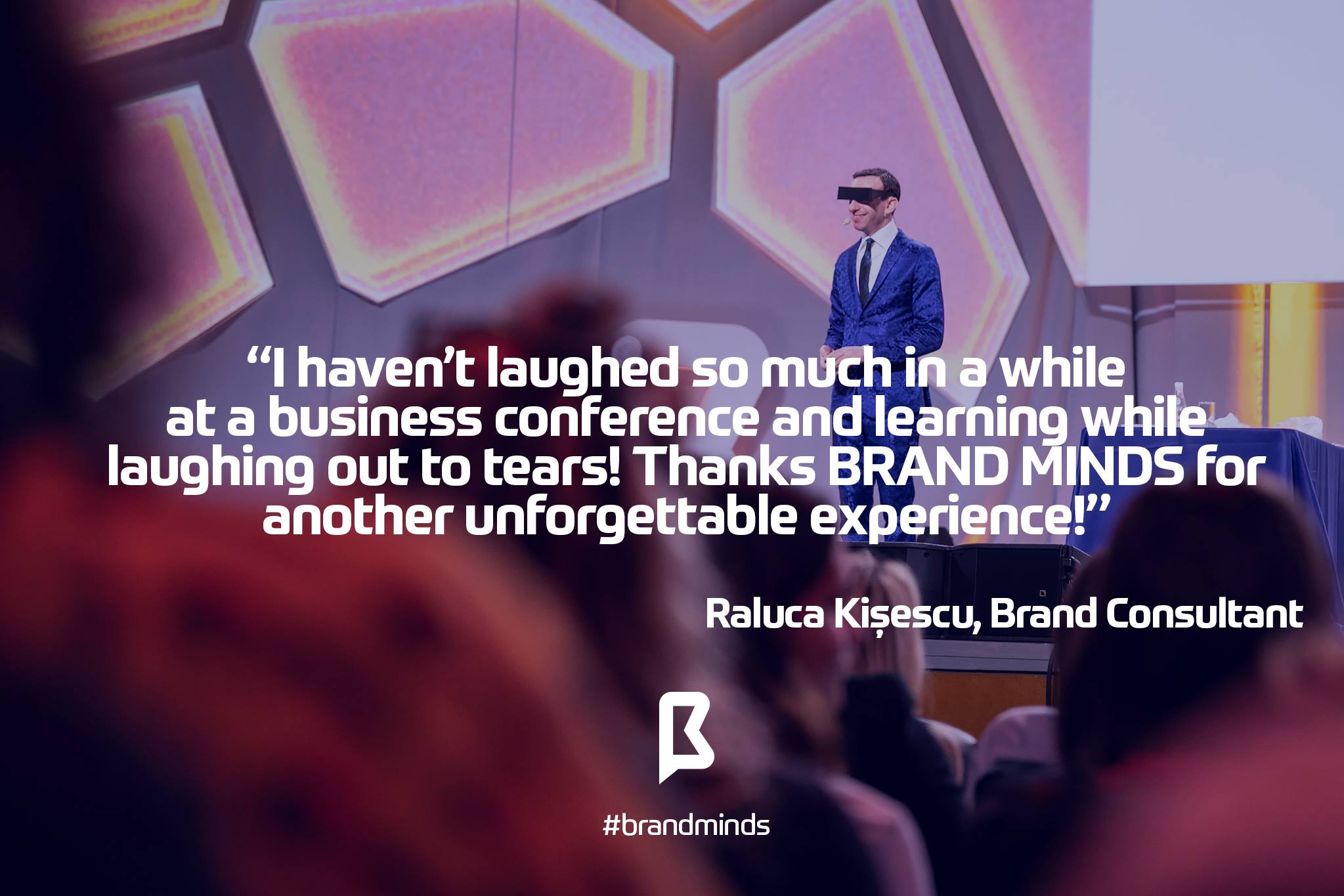
If any of our speakers are unknown to you, tell yourself this:
I don’t know them but if they have been selected by the BRAND MINDS team to speak at their conference then they must be worth the spotlight and my time.
And last but not least:
The Live Experience Is The Best Experience
Reading Seth Godin’s book is great, but nothing compares to seeing him live, on stage, delivering his speech. Sitting just a few steps away from him, you can feel his passion, laugh at his witty comments or think about his words deeply and purposefully.
It’s an amazingly engaging experience that you just can’t get anywhere else.
These are my arguments for BRAND MINDS being a life-changing experience.
But don’t take my word for it.
Come to BRAND MINDS and see for yourself!

www.VitzmanPhotography.com
Join the Conversation
We’d love to hear what you have to say.
Get in touch with us on Facebook Group and Twitter.
How to increase trust and create well-being in your organization
“Trust is the willingness to be vulnerable to the action of others. Trust is a choice. Trust means that we have confidence in the intentions and motives of the other party. We trust it to advance and to protect our interests, our wellbeing. We understand trust as being the quality of love, commitment, friendship and partnership,” wrote Aldo Civico for Psychology Today.
According to weforum.com, PwC has conducted research, run focus groups and talked to both leading experts as well as the everyday person on the topic of trust, the question being: what makes up trust in a business – and can it be quantified? What they found out was that, indeed, trust could be measured. When considering if a company should be called trustworthy, people are looking for:
· Competence – Does the organization do what it says it will?
People expect companies to be reliable and transparent. A fast-food company should be upfront about the possibility their delivery will be delayed, for example. In cases of major delay, companies should be forthright about not even accepting the customer’s order. Fast food is supposed to be “fast”, after all.
· Experience – Does the organization keep its promises?
Companies are expected to be responsive, to listen to public feedback, to make the necessary improvements and treat customers as individuals. (My experience with Marks & Spencer’s high-quality and consistent customer service comes to mind again.)
· Values – Do you believe in the organization?
People want brands to understand their needs, to hold the right sort of principles and to care about their impact on society. Clothing retailers that source their cotton from fair trade suppliers are increasingly in demand because they are not seen to be exploiting cheap labour and because their products will benefit small-scale agricultural workers.
At the same time, The Ken Blanchard Companies researchers surveyed 1,800 workers looking at the connections between trust, well-being and coaching behaviors.The research found that trust and well-being were both positively impacted by perceptions of managers engaging in three key behaviors.
- Facilitation: Helping employees to analyze and explore ways to solve problems and enhance their performance.
- Guidance: The communication of clear performance expectations and constructive feedback regarding performance outcomes, as well as how to improve.
- Inspiration: Challenging employees to realize and develop their potential.
Moreover, a paper which accompanies the research shared four coaching skills to help managers move away from some typical tendencies—telling people what to do, making assumptions, and solving problems—and instead adopt a coaching mindset. Those skills are: listen to learn, inquire for insight, tell your truth and express confidence.
On its turn, inc.com identifies four critical elements of trust that leaders need to be aware of and that apply to both leaders and team members alike: able, believable, connected and dependable. More on their perspective one can read here.
Top 10 Mistakes Marketers Make When Hiring Agencies
-
- Not choosing the right time to outsource. Timing is essential,just like every other business decision one makes. It has to be chosen carefully and with a lot of attention. When confronted with the idea of outsourcing a service or some competencies, the company’s representative must take in account first if its the right time to make that certain decision at that time,for the company, and, at the same time, what concluded to that decision.
2. Spending too much time deciding if to make the move or not. While it is very important to make sure the timing is right spending too much time going back and forth on the decision wouldn’t do you any good. You must be decisive and confident on your choices.
3. Outsourcing the wrong activity / activities. If you hire someone outside of the office, you should give them the things they can do best. Always choose the best specialists or companies you can afford. Creating a company brand and marketing goals should be done inside your office, so make sure you discuss your culture code, style and requirements with the outsourced marketing partners before kicking off the project.
4. Having unrealistic ROI expectations. When you entrust the marketing or communication activities of your company, you should set some realistic expectations. One of the biggest mistakes of many companies is that they think outsourcing all their problems will solve them at once and there will be no need for them to participate in marketing decisions, activities and so on. Do not forget that brand awareness, a firm customer base and long-term faithful relationship with customers take time. Results don’t appear over night,it takes a lot of effort both at an external,but also internal level to reach your goals.
5. Forgetting that PR doesn’t sell per se. When looking for a PR partner outside your company make sure you first of all understand that PR doesn’t equal immediate sales. And no professional PR specialist will promise you that. That being said, a successful PR strategy will definitely affect your sales success indirectly through 3 factors: brand awareness & recall, credibility, as a secret marketing weapon.
6. Not doing the right research before the pitch. One of the most important steps is doing your research about the agencies you are interested in. A simple Google /Linkedin / Facebook search will not help you in taking the best decision of which agencies to call on the pitch or for a presentation. Instead try looking at their portfolio, at the case studies, at the awards the won, the services they provide, etc. Talk to their current clients. Read their reviews and their blog. See if the media was interested in them or not. Does their language vibe with you? Do their clients remind you of your company? Do they have documented results similar to the ones you want?

7. Asking more than 5 agencies in the pitch /presentation. If you know what you want from your agency, and you should, you don’t need more than 5 agencies briefed. You save both their time and yours and you are closer to choosing the right partner for your business. A good research will help you make the right choices.
8. Falling for shiny presentations. Make sure the very creative and crazy ideas presented to you, as beautiful and as interesting as they may sound or look like, are backed up by facts. The company or specialist you are hiring must be able to create and implement what presented to you. And most of all, bring results.
9. Letting the price be the main criteria. Choosing the most expensive agency doesn’t guarantee you the best results, but basing your decision firstly on the amount of money you pay for the collaboration will prove to be a bad call. Cheap will be cheap no matter how you look around it.
10. Not listening to your gut feeling. After years and years of experience, the instinct is very good and calibrated. We believe is very important to always have it with you and use it,when necessary.
Top trends in shopper marketing in 2018
With a more and more savvy consumer and digital and technology re-shaping it, shopper marketing became in the last years almost a science, relying a lot on research and customer observation. While in the US, the Shopper Marketing magazine developed a very strong research on this year’s trends that can be read here, we asked 3 local advertising specialists to give us their thoughts as well.

Cristina Oncescu, Head of Strategy pastel
What do you believe will be the biggest shopper marketing trends of 2018?
I don’t know if they are the biggest, but they are certainly hot in 2018:
- Personalised shopping
There are many in-store technologies that can be used to provide a personalised shopping experience. NFC (Near Field Communication) chips, QR codes, iBeacons and Visual Light Communications are just some of the emerging technologies used. These, when linked to previous shopping histories via a loyalty app for instance, can provide disruptive yet compelling interactions with the shopper as they enter the store.
- Virtual assistance
From voice to chatbots, going through messenger apps, one-to-one communication is on the rise. Being available and being helpful, when the shopper needs you, is making the difference.
- Augmented Reality
The use of Augmented Reality on mobile devices provides an engaging way for marketers to reach their target audience – it’s quick, easy and very interactive. With the integration of AR on iPhones, it will be easier for marketers to engage larger audiences during their path to purchase.
What are they influenced by and why?
Technology, and especially mobile, led shoppers becoming more and more omnichannel. Now, this is an actual behaviour that the shoppers engage in (of course in a subconscious way). Web, mobile, social, apps – it’s all just shopping to consumers. The separation between retail channels is growing even more blurred by the day. Can they return online products in-store? Can they check if the store has their size and colour on their mobile phone before they leave their homes? Consumers expect a seamless experience across all channels.
What is pastel advising its clients this year?
Great content will always engage. Have an interesting, consistent story and a seamless experience throughout the whole omnichannel path to purchase.

Anton Gherca, Chief Innovation Officer at g7
What do you believe will be the biggest shopper marketing trends of 2018?
We believe that shopper marketing is an area of brand communication that has been kept largely untouched by the digital revolution that is reshaping the advertising industry for the past 10 years. So we expect that „digital BTL” will start gaining momentum, as today’s practices are deeply engrained in traditional approaches of point of sale communication. We think that we will see more connections between social media and shopper marketing, and geofencing and point of sale promotions, with the aim of delivering a more integrated omnichanel shopper experience.
What are they influenced by and why?
Like many things in advertising, the move towards a more „digital” shopper marketing approach is driven by the consumers themselves, or more precisely, by their lifestyle. As of 2017, the penetration rate of smartphones in Romania is 70%, while 41% of the population are already mobile social users. Peer-to-peer ridesharing like Uber makes people understand the benefits of the sharing economy, on-demand services like Netflix put them in the driver’s seat while the wide 4G coverage makes them want everything now. This means people are getting more and more accustomed to having everything at a push of a button and they expect higher levels of service, increased transparency, embedded interactivity and all in all a better customer experience out of everything.
I know this sounds like a bunch of buzzwords cramped togheter in one sentence, and our agency has never been in the „buzz” business, but the reality is that the shift in consumers’ lives is happening with or without us. I think the bottom line is that today’s shoppers are just expecting something more out of marketing communications. More relevance, more engagement, more customization. This doesn’t mean that we, the shopper marketers, can’t still get away with the old „buy one – get one” or „scratch this to win a prize that you don’t even want” mechanics. But wouldn’t that be a pity?
What is g7 advising its clients this year?
Our agency has embarked in a digital transformation journey and once set in motion, it can’t be stopped. We will continue an initiative started in 2017, of hosting periodic innovation workshops together with our clients for identifying the opportunities put forth by today’s technology, and see where that gets us. Still, there are a couple of areas we keep tightly in our focus: Proximity marketing, Loyalty management and Gamification. We work towards integrating in an organic manner these three capabilities in the approach our clients are already used to: honest creative work, deep understanding of shopper behavior and solid deployment in the retail ecosystem.
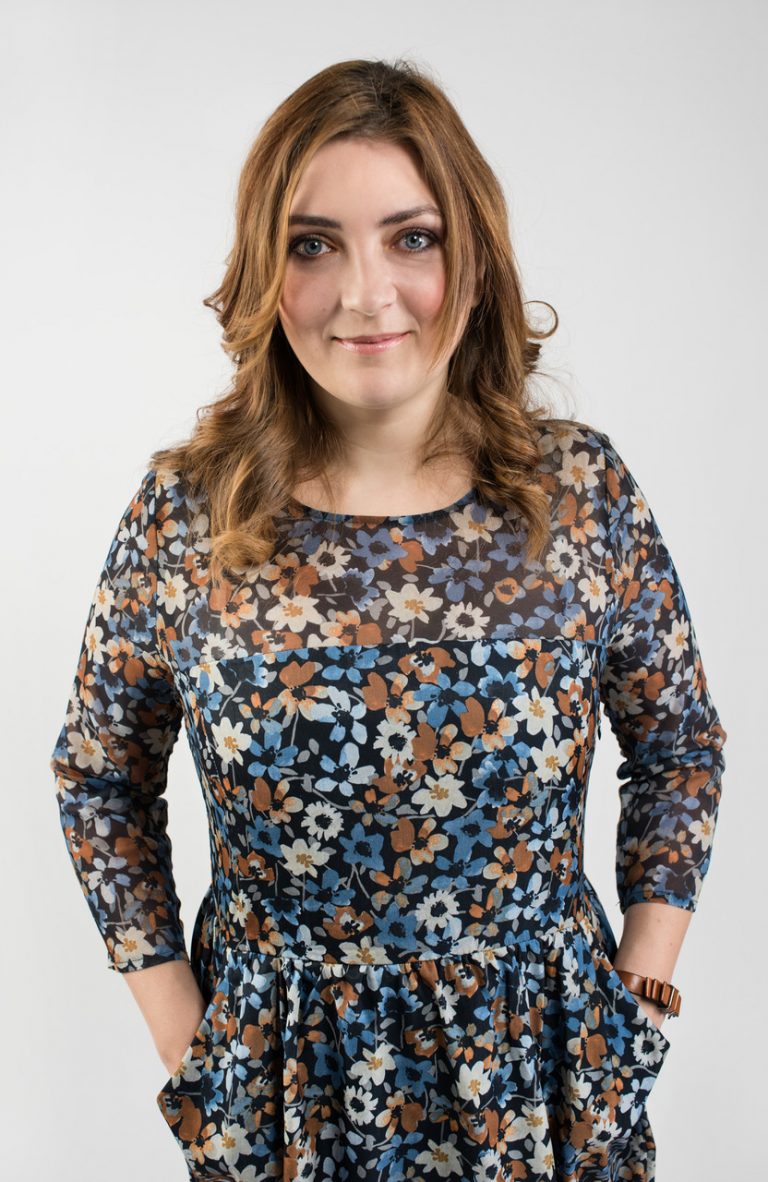
Ondina Olariu, Business Director Geometry Global
“Fragmentation, increased competition and e-commerce are key words for 2018 and beyond in our region. After seeing a huge expansion, somewhat even inflated for some of the retail players, we will witness a new battleground, named proximity. As global retailers keep expanding, we will live through a great variety of formats, more flexibility and adaptation to micro-retailing needs. Proximity will be influenced as well by the increasing degree of urbanization, as well as the new generations of shoppers, more dynamic, digital savvy and format switchers (in Romania, 25 cities cover 31.3% of total population and 55.6% of urban population – source: INS, Romania, 2017).
And when we say flexibility and adaptation, think beyond format, as we see discounters aggressively stepping in the services territory, while share of consumer spend reached 68% in services vs 32% in goods in 2016 (source: Kantar Global Trends 2018). Goods subscription – meaning bundle goods as a service is something that we preached our clients for a couple of years already and it’s approaching it’s turning point in 2018.
E-commerce in Europe is predicted to reach 10% of total retail (source: Kantar 2018 Global Predictions, WPP Data), with a clear future towards what we call omni-channel, especially since gen Z takes the scene as newest shoppers. At global level we see the switch and struggle of most pure e-commerce players in becoming physical as well, to the level where blogs impersonate the physical space in temporary shops where experience blends with sales, while in Europe we are taking steps into developing the brick-and-mortar into e-commerce, especially for FMCG area, which are the most shopped for categories. Retailers will continue or start monetizing opportunities through their own apps, following the evolution of more mature markets, such as Spain (+210% in app sessions growth in the last 2 years) or Germany (+130%). Here again, it seems that pure digital players have a degree of advancement, since digital-first retail apps saw more that 2x the average sessions / user each month and saw stronger growth in the last 2 years. (source: App Annie 2017 retrospective report). This means we will see accelerated growth for digital players apps, as the new arrivals from physical retailers will need to extract good lessons and apply on fast track.
Blending online and offline expresses also in automation, such as automated cashiers. As retailers will increasingly see value, watch for a retail unemployment crisis, especially in more mature markets. The proliferation of private labels will increasingly force out brands from the physical shelf. Most of these private labels continue to be supported as brands rather than price options, from food to fashion (see Esmara for Lidl and Tex for Carrefour) and home appliances (eg Carrefour Home consumer electronics). Health and Wellness is an increasingly appealing theme, for both brands and retailers. Watch the shelf space growth in store, as well as the latest positioning of certain private labels, trying to capture value and exploit the trend.
As a shopper agency, we are not only advising but already working with our clients on the omni-channel shopper journey models, including retailer strategies and new channels opportunities in this process. We build with them strong e-commerce fundamentals for the Romanian market and expand to e-commerce experiences and integration of channels for more mature markets. We operate with an increasingly complex model that includes data management and A/B testing applied to shopper initiatives and integrate thorough shopper knowledge in every solution we bring to the table. Bonus: an emerging trend, still less visible to this market is the return to D2C (Direct to Consumer). It will be highly influenced by retailers’ behavior, however, more brands become conscious they cannot rely exclusively on retailers and distributors in building their relationship with shoppers and consumers, therefore they’ll be trying to find ways to cut it short to them and bypass the “official” channels.”
Meet Joe Escobedo, One of Singapore’s Brand Minds
Recognized as one of the “Top 20 Content Marketers” worldwide and awarded the “Most Influential Global Marketing Leader” at the World Marketing Congress, Joe has helped countless organizations and executives transform from relative unknowns to superheroes online. He has also created and led successful digital marketing, branding and PR campaigns for both startups and Fortune 500 firms. He is a contributor for both Forbes and the HuffPost, as well as an award-winning speaker. His articles, interviews and talks have been read or heard by nearly one million people.
What is the significance of Joe Escobedo “The Brand Builder” and what is the story behind it?
“The Brand Builder” is a moniker given to me by my colleagues when we were trying to create ‘superhero’ names for the team.
You worked with companies from U.S., China and Singapore, which market did you like the most and why so?
The safe answer would be Singapore, but my five years in the gauntlet known as China made me what I am today. It taught me humility and the importance of guanxi (relationships).
Name one situation that made you want to quit and change your career.
I want to learn something everyday so there were times in my career where I felt like I wasn’t learning anything new or pushing myself hard enough. It’s during those times that I’ve transitioned to a completely new field or market. Sometimes I’ve failed miserably, but I learned from each experience and have grown from it.
Name one situation that made you want to go forward.
I’m driven when people tell me I can’t do something. I’ve been told that more times than I can count throughout my career. During those times, I think in my head, “hold on a second and watch this!”
What do you think are the most difficult challenges marketeers have to face in Asian markets nowadays?
Taking a long-term view. Too often, global headquarters look to the regional office in Asia and say, “You’re our growth engine now so you should be growing at a double-digit rate.” The problem with that is that it forces marketers to look only at the month ahead, rather than what’s going to rise up and disrupt their industry next year.
Investment matters. If you would invest in one particular business field nowadays. What would that be?
If I were looking for some quick cash, I’d say anything A.I. related. But I generally play the long game so I’d invest in things people always need, like food and toilet paper.
If you could change something about Singapore’s marketing community to improve it in any way what would that be?
I’d encourage the Community to take risks and invest more in digital. An ad plastered over the MRT may look great but what’s the return on your investment?
What made you settle down in Singapore?
The short answer: love. I followed my wife who received a job offer before I did.
Meet Joe Escobedo, The Man behind the suit
Name one good habit that helps you deal with your active life.
Reading to my daughter, because in that moment, I’m not Joe “The Brand Builder.” I’m whichever character I’m reading in the book.
Name one bad habit you can’t quit.
Speed walking. I tend to walk like I’m always 15 minutes late to a meeting.
If you could be anything else but a marketing leader, what would you be?
In another life, I would’ve been a film director. I wrote, directed and edited a sketch comedy movie when I was in college. I loved the experience and think I could’ve been a third-rate Christopher Nolan.
You are recognized as “One of the Most Influential Global Marketing Leaders”. What’s your favorite movie of a global marketing leader?
Don’t know if it’s about a global marketing leader per se, but Game of Thrones. After over a decade as a marketer, I see too many similarities between that show and the marketing world, albeit slightly less violent. For instances, strong alliances with the “right” groups can help you get closer to the corporate Iron Throne.
Tell us your favorite book. What’s the best thing you learned from it?
“How To Win Friends & Influence People,” by Dale Carnegie. I’ve read the book at least 10 times and everytime I ‘learn’ something new. My favorite lesson is about putting yourself in the other’s shoes – thinking about what they would want rather than what you’d want them to do.
Name the most important value you have.
Grit. It’s the only reason I’m still around and kickin’ in the professional world. Because even when I get battered to the ground, I claw my way back up. It’s an invaluable trait for any marketer or entrepreneur.
Name the most important value a leader should have.
Empathy. Every boss wants to make the most profit they can but they can only do so with a strong team behind them. And the only way to build and retain a strong team is to empathize with your staff’s situation. If they get demotivated because a client scolded them, then give them a pep talk. If there are unseen circumstances that caused them to miss a deadline then be understanding to their situation.
If you could compare your journey as an entrepreneur with a song, what song would you choose?
“Highway To Hell.” Just kidding! Instead of a song, my journey can be best described by “The Road Not Taken” by Robert Frost. From my move to China when I was 22, my career has been characterized by these lines: “Two roads diverged in a wood, and I— I took the one less traveled by, and that has made all the difference.”
Tell us the funniest experience you had this year related to your work.
Some of the funniest moments during the past year happen behind-the-scenes. For instance, we use to have “Happy Friday” dance parties at my company. And I’m not one to brag but my rendition of “Hotline Bling” by Drake stole the show.
If you would give our readers one advice from your professional experience, what would that advice be?
To quote the great Conan O’Brien, “If you work really hard, and you’re kind, amazing things will happen.” I truly believe that. Because everyone wants to help the hardworking nice guy or gal.
What is your biggest expectation for the Brand Minds ASIA event?
I’m looking forward to seeing Gary V walk on stage to a deafening cheer, unleash some savage knowledge and drop the mic.
Why it’s worth working with freelancers

After the economic crisis the whole system changed and it will never get back to what we used to know. That is a given fact, proven times and times again. Adapting to this new reality, that came with its pros and cons, business owners had to change the way they were thinking prior and enjoy the new possibilities it offers. For instance, really experienced people that decided to go on their own and try being freelancers or digital nomads or small entrepreneurs.
What does a business owner or a manager win by collaborating with freelancers instead of full-time job employees? We gathered some major points one should definitely take in consideration
Experience and affordability, working hand in-hand
While hiring a full-time employee comes with a lot of responsibilities and financial and legal hustle, outsourcing part of your services to freelancers offers the company the possibility to pay a smaller fee compared to one offered to a company or a full-time employee, for a more experienced, professional personal. A freelancer working remotely doesn’t have to meet lots of overhead costs. Additionally, freelancers generally cover their own health care and other such benefits.
Moreover, they worked on a variety of different businesses from diverse locations, which makes them really valuable in insights and know-how. Each client or job adds more experience to their craft, bringing more skills to their ever growing arsenal.
Flexibility
Flexibility in projects and in hours. As most of the freelancers choose this type of professional life due to the flexibility it offers them in arranging their time as they consider fit, choosing the projects they take on, it also offers them the flexibility in their approach to you, the business owner or company representative. The freelancer will be able to work, without complaining, at hours that the employees wouldn’t consider fit. At the same time, don’t forget that you can always choose to work with a freelancer that lives miles and continents away, therefore the flexibility running higher. Frankly, the main reason why many freelancers have opted to freelance is because they love setting their own working hours.

Freedom
Derived from the previous point, choosing a freelancers also comes with more freedom, both for you and the freelancer. Instead of engaging a full-time member of staff, you can conveniently work with an external resource person on a need basis. Engaging a specialized freelancer only project based or on a limit period of time will prove to be cost-effective and very lucrative.
Fast and great quality
For a freelancer the reputation is one of the main assets he / she possesses, therefore they will always be motivated and show a lot of initiative and interest in the project, doing a fast and great work, every time. They fully understand that it’s in their best interest when they remain reliable and exceed your expectations.
Adapting better to new trends and technology
As a freelancer one must always be up to date with the latest technology and not be surprised by almost anything in their field. Moreover, being an expert also brings the need to always learn, get more expertize and better oneself. Qualities that the employer will receive every time they contract a freelancer, without having to invest in employees’ specialization, workshops or other types of training.

Good experts in specific tasks
When looking for a particular skill or having a special need, a professional freelancer specialized on a certain field is the perfect answer to one’s problem. Your project only has to gain from this collaboration.
Their understanding of small and medium businesses
Freelancers understand better the way the small and medium businesses function and are able to offer them the right solutions to their problems and help them grow. Because they often work on start-up projects they pick up a lot about how to build start-ups properly and how things ought to be done. Agencies tend to work with bigger clients or established SMEs whereas the freelancer is more of a natural fit. After all becoming a freelancer is like starting your own business in many ways.

Inspiration at its best
Working remotely, from the middle of the forest, in top of a mountain or on the beach, wearing want makes him comfortable and not an “work outfit” makes the freelancer be a more inspired and creative person. And that will only benefit the work you are doing together.
Happy client, happy freelancer
Each time a project is finalized successfully and the client is happy, so is the freelancer that knows a good review will help him along in his career more than if he would have been just an employee.
Failure is not the end
We are not used to talk about it, to consider it part of the process, to give it its big importance, to learn from it and understand that it might, or might not, take us to the success. What is sure ids that we mustn’t be afraid of it, try to hide it underneath the carpet and pretend like it never happened. The most successful people in the world lived through it, surpassed it and pushed through. Many entrepreneurs that we know and appreciate nowadays have failed with other previous business or fail daily in more or less important parts of their jobs or activities. Failure makes them stronger, teaches them the values and the importance of appreciating every step of the business track and, more than anything, the success, when and if it comes.
“We all have different definitions of failure, simply because we all have different benchmarks, values, and belief systems. A failure to one person might simply be a great learning experience for someone else. Many of us are afraid of failing, at least some of the time. But fear of failure (also called “atychiphobia”) is when we allow that fear to stop us doing the things that can move us forward to achieve our goals,” believes the team of www.mindtools.com.
The fear of failure may have various causes and goes back, most of the times, in our childhood, just like it happens with most of the things that define our lives and whom we are meant to be. Not having the right support, being undermined or humiliated in childhood, those are some causes that will most definitely carry negative feelings into adulthood.
As the editors of edutopia say, failure is an inevitable part of life, but it’s often accompanied by shame — most people do everything in their power to avoid it. As educational philosopher John Dewey said, a true thinker learns as much from failures as from successes. What if educators worked to take some of the sting (and the stigma) out of failing, and encouraged reflection and revision to build upon the lessons learned? “Perhaps there’s a goldmine of opportunities if we can re-frame failure as a valuable learning experience, an essential step along the path to discovery and innovation,” they added.
“Not talking about it is the worst thing you can do, as it means you’re not helping the rest of the organization learn from it,” said Jill Vialet, who runs the nonprofit Playworks. “It gives [the failure] a power and a weight that’s not only unnecessary, but damaging.” Vialet added, referring to the fact that the people involved in the failure should speak about it openly and work to prevent history from repeating itself.
This idea is already ingrained in the cultures of some for-profit industries. For example, in Silicon Valley, failure is a rite of passage. “If you’re not failing, you’re not considered to be innovating enough. Silicon Valley investors, in turn, regularly reward entrepreneurs’ risk-taking behavior, though they know the venture may fail and they will lose their capital,” it’s shown in an article on opinionator.com. In addition, Jill Vialet of Playworks emphasizes the importance of “failing fast and cheap” (as opposed to slow and expensive). She sets aside a budget for new programs that intentionally have unpredictable outcomes. They limit the scope of these programs, clearly define failure and success at the outset, and decide when to measure the new program’s merits. “It’s about being disciplined and rigorous,” said Vialet, since human nature normally prevents us from recognizing our mistakes while they are occurring, quoted by opinionator.com. A great article on the subject one also can find on guardian.com.

It all depends on how the organization and the people that run it see failure and its importance in business. Just as some organizations encourage employees to talk about failure in office events that are closed to the public, others publish their failures for the world to see. Engineers Without Borders Canada, which creates engineering solutions to international development problems, publishes a “ failure report” every year alongside its annual report. “I only let the best failures into the report,” said Ashley Good, its editor. The examples that are published, she said, show people who are “taking risks to be innovative.”
Moreover, Good also started a Web site, Admitting Failure, to encourage people working in international development to share their stories of failure. The site includes stories about arriving unprepared to an emergency medical situation in the Middle East, the theft of an expensive and underused water filter, and more.
In addition to nurturing a culture of innovation and reflection, talking about failure helps build a canon of knowledge of what not to do in the future.
Still, change doesn’t come over night and building a culture of openness to failure takes time and consistent effort. In the majority of cases, however, failure in the social change world does not involve as many dollars or stakeholders, and admitting it can have a net positive impact on an organization. Doing so can build institutional knowledge and create a culture where people are more open to taking risks.
Often, valuable insights come only after a failure. Accepting and learning from those insights is key to succeeding in life.
“The ability to grow and keep trying when you don’t succeed — resilience and grit — are key to cultivating a growth mindset, in academics and in life. I like how the business world has coined the term “failing forward” to mean using mistakes as stepping stones along the road towards achieving your goals”, says edutopia.org.
We can choose to see failure as “the end of the world,” or as proof of just how inadequate we are. Or, we can look at failure as the incredible learning experience that it often is. Every time we fail at something, we can choose to look for the lesson we’re meant to learn. These lessons are very important, they’re how we grow, and how we keep from making that same mistake again. Failures stop us only if we let them.
“Maybe failure doesn’t always lead to success but is simply the price of doing the right thing. Or sometimes tragedy strikes for no reason and without any apparent benefit. Maybe success in the broader sense comes in the form of failure itself when success’s definition is no longer limited to our individual lives,” says Anthony Sabarillo for medium.com
Instead of conclusion, we leave you with a very interesting article on lifehack.com, showing you six reasons it’s ok to fail.
Top 20 business people to watch for in 2017
Each one of us needs to be inspired, to meet and read about inspirational people and success stories that truly show us that the sky is the limit. We compiled of list of great entrepreneurs, social media influencers, both men and women, that we believe deserve a look over their careers so far and that will still be a great inspiration in the years to come.
Neil Patel – an internet marketer and conversion expert, best known as the founder of Crazy Egg, Quick Sprout, and KISSMetrics. Recognized as a top 100 entrepreneur under the age of 30 by President Obama, Patel is also a regular, respected contributor for publications such as Inc., Fast Company, Forbes, Entrepreneur.com and TechCrunch. He helps companies like Amazon, NBC, GM, HP and Viacom grow their revenue.
John Rampton is a serial entrepreneur, connector, and the founder of Due.com. Rampton has hailed as No. 3 of the Top 50 Global Online Influencers and one of the Top 10 Most Influential PPC Experts in the World for 3 years running. Time Magazine recognized John as a motivations speaker that helps people find a “Sense of Meaning” in their lives. He currently advises several companies in the bay area. John loves helping others succeed online. It’s all about helping and giving back. It brings me joy in my life.
Chris Stoikos is best known for his hilarious viral videos, which generated 130M views and $10.5M in sales in the past year alone as part of his venture Dollar Beard Club. Stoikos has also appeared on NBC’s Shark Tank and generated millions in revenue for various product launches. is a highly regarded serial entrepreneur with two successful exits under his belt. He is an expert at creating and organizing dynamic teams that can execute business ideas quickly and effectively, and set them up to be self-sustaining organizations.
Ann Handley has been named by “Forbes” as the “Most Influential Woman in Social Media” and one of the Top 20 Women Bloggers. She is the chief content officer of MarketingProfs, a training company that empowers marketers internationally with the skills they need to drive success at their companies, and her book “Everybody Writes” is a Wall Street Journal bestseller. She is also the co-author of the best-selling book on content marketing, “Content Rules: How to Create Killer Blogs, Podcasts, Videos, Ebooks, Webinars (and More) That Engage Customers and Ignite Your Business.”
Moreover, a pioneer in digital marketing, Ann is the co-founder of ClickZ.com, which was one of the first sources of digital marketing news and commentary.Shradha Agarwal co-started Context Media with a goal to help patients with chronic diseases better manage their health. She is now reaching more that 6+ million patients a month. Shradha co-founded JumpStart Ventures in 2011 to fund other passionate entrepreneurs who are executing ambitious solutions in healthcare, education and media communications, and has since backed more than 40 companies with over $10 million in venture investments. She mentors entrepreneurs at Techstars, Impact Engine & Blueprint Health, but is equally invested in the venture philanthropy model for scaling nonprofit solutions through SVP Chicago and The Chicago Public Education Fund. She serves on the boards of OneGoal and Chicago Children’s Choir and spiritedly supports youth education, women leadership, and civic engagement. The CEC recently honored the two ContextMedia co-founders with the “2015 Chicagoness Award” for their deep commitment to developing the city’s ecosystem. Agarwal was honored as a Champion of Change by the White House, recognized as Best Female Founder at the United Nations, and won a Moxie Award as “Tech Woman of the Year” in Chicago.
Anthony Smith is Founder and CEO of Insightly, a San Francisco-based company that provides customer relationship management (CRM) cloud-based software to more than 1.2 million customers in 200 countries. After identifying a market need for a CRM solution for small businesses, Anthony built the first version of Insightly himself, using his previous experience of designing, constructing, and implementing CRM software for enterprises.
Julia Taylor Cheek isn’t new to business, but the Harvard Business grad’s new company is literally changing the way we live. Cheek’s company, EverlyWell (of which she is both co-founder and CEO) is simplifying health testing and putting it into words and charts that everybody can understand.
Branden Hampton is the king of social media, having built over 33M followers across Instagram, Twitter and Facebook. He’s also the CEO of the social media marketing company One Penny Ad Agency and co-author of “ How to Set Up Your Business for Under $1000”.
Brian D. Evans is an Inc 500 entrepreneur and the founder and CEO of Influencive, an online publication read by millions of young entrepreneurs. His company, BDE Ventures had 2,388% growth in 3 years and was the 25th fastest growing advertising and marketing agency in America.
Ekta Sahasi is the vice president of the U.S .Business Innovation Center (BIC) for Konica Minolta, where her team seeks out new places to invest in disruptive technology that can advance the company’s competitive advantage. When not investing in startups and overseeing innovation at Konica Minolta, Sahasi helps startups understand how they can enter Asian markets and work within those cultural parameters. Prior to joining Konica Minolta, Ekta spent 10 years at eBay Inc. where she co-founded and led both eBay and PayPal’s Research and Innovation Labs. She successfully developed one of the largest corporate innovation programs, and experimented with emerging technologies for enhancing existing technology stack and M&A. As Director of Innovation Products and Research at PayPal she built and scaled a global cross-functional team and led the strategic vision and execution of high-impact projects.
Russ Ruffino: Founder and CEO of Clients on Demand, the most reliable client attraction system in the world, Ruffino has helped coaches and thought leaders all over the world build six-figure monthly businesses from scratch. His massive success in marketing and as a business owner has allowed him to become one of the most respected business coaches in the industry.
Pejman Ghadimi is a self-made multi-millionaire, serial entrepreneur, best-selling book author and currently the CEO and Founder of Secret Entourage. The platform was started in 2009 to help bring together some of today’s greatest and brightest CEO’s, business owners and innovators in an attempt to help bridge the gap between formal and self-education by providing current, relevant, as well as affordable coaching and mentorship. Secret Entourage presently is home to over 280 accredited entrepreneurs covering more than 100 industries, over 30,000 students and reaches millions through social media. Since its launch, Secret Entourage has expanded its reach to over 1,200,000 new individuals each month and has grown as an accepted brand in the business and lifestyle community. The organization has to date aided tens of thousands of individuals and organizations in reaching their full potential. Secret Entourage has also helped unify accredited Entrepreneurs with the mission of bringing back the true meaning of entrepreneurship, and to be an inspiration to all. In 2012, Pejman authored Third Circle Theory, Gen Y’s blueprint to Entrepreneurship which had sold over 50,000 copies by mid 2013.
Pejman is also the owner and founder of VIPMotoring.net, a unique luxury lifestyle concierge service which currently was said to be “one of the best sources of education for today’s modern millionaires” by Forbes in 2012.
Roger Bryan is a serial entrepreneur with two successful exits: a marketing agency and an ecommerce business. His current venture, Enfusen, named a Top 10 Tool Entrepreneurs Can Use to Automate Their Business by Inc., is a machine-learning analytics platform that helps digital marketing agencies drive increased traffic and conversion for their clients.
Sam Ovens: Ovens has told the story how he started completely broke, working out of his parents’ garage in New Zealand, and in five short years, started a consulting business, moved to New York and made over $20 million. Ovens helps everyday people quit their jobs and “job-like” businesses to start their own highly leveraged consulting business. His methods are shaking up the consulting industry. Since 2011 he has created 14 millionaires and 340 six-figure earners with his training programs.
John Sculley and David Steinberg, ZetaGlobal – Former Apple and Pepsi CEO John Sculley and David Steinberg have become darlings of the marketing tech world, creating a business that provides analytics-driven platform that can also both see the customer’s life-cycle, measure ROI and understand your audience for intelligent marketing across the board. The company remains profitable, and made over $300 million in revenue the last year. Considering the cutthroat nature of the business, marketing tech leaders should pay real attention to Sculley and Steinberg as Zeta continues to grow.
Raviv Turner, CaliberMind, is a serial tech entrepreneur and former Israeli intelligence of CaliberMind, stands out. The company plugs into your CRM and content pipeline and uses psychographic ( a huge secret weapon in marketing) profiling of your sales and marketing calls, emails and customers’ social feeds to intelligently inform you both how to communicate with them and what content to feed them, such as security content for a security-minded person.
Amanda Signorelli, CEO of Techweek, is building tech-based entrepreneurial communities in major cities across North America, helping local business break through.
Danielle Morrill, CEO and co-founder of Mattermark, is improving the way that businesses find and connect with the ideal customers, simplifying the process of finding leads for businesses of all sizes. Small businesses will want to keep Morrill’s company on their radar in 2017.
Natalya Brikner – Founder and CEO of Accion Systems Inc., brings her MIT rocket science knowledge and experience to help push space-travel forward – all before the age of 30.
- Not choosing the right time to outsource. Timing is essential,just like every other business decision one makes. It has to be chosen carefully and with a lot of attention. When confronted with the idea of outsourcing a service or some competencies, the company’s representative must take in account first if its the right time to make that certain decision at that time,for the company, and, at the same time, what concluded to that decision.
